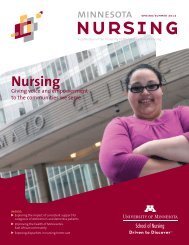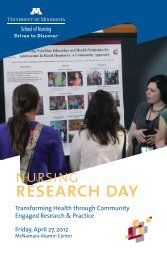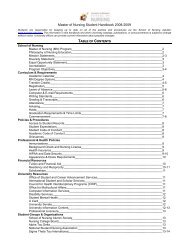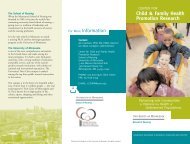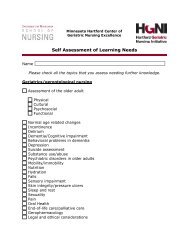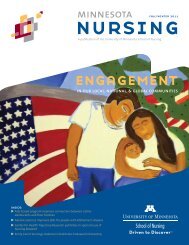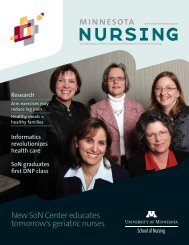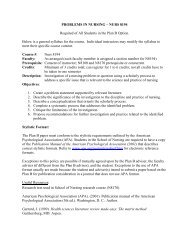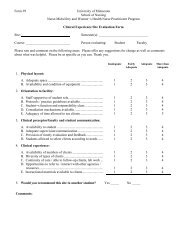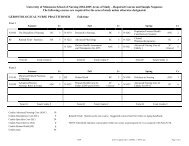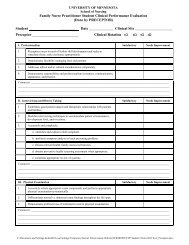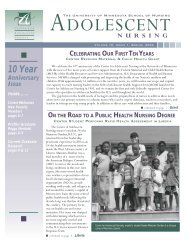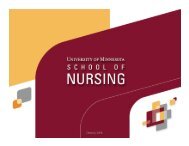BSN Student Handbook - School of Nursing - University of Minnesota
BSN Student Handbook - School of Nursing - University of Minnesota
BSN Student Handbook - School of Nursing - University of Minnesota
You also want an ePaper? Increase the reach of your titles
YUMPU automatically turns print PDFs into web optimized ePapers that Google loves.
Academic Standards<br />
All nursing students are expected to exhibit the attributes <strong>of</strong> accountability, integrity,<br />
pr<strong>of</strong>essionalism, regard for self, regard for others, respect, responsibility, safety, and<br />
theoretical competence. These attributes are described in the following academic standards<br />
and examples. Details <strong>of</strong> the relevant policies regarding satisfactory academic progress,<br />
academic dismissal, and academic probation are found in the policies section <strong>of</strong> this handbook.<br />
Note: Examples are illustrative and not intended to encompass all specifically desired actions.<br />
<strong>Nursing</strong> students will:<br />
1. Assume personal responsibility for their nursing education.<br />
Example: Attend classes and labs as assigned; be prepared for classes and clinicals; initiate<br />
consultation with faculty about clinical/academic progress. The students will attend classes and<br />
participate in courses in an active manner.<br />
2. Demonstrate accountability in the clinical area and in coursework.<br />
Example: Meet obligations for clinicals as outlined in the course syllabus or by the teacher or<br />
agency policy; meet obligations for coursework as outlined in the course syllabus; communicate<br />
absence due to illnesses and other emergencies.<br />
3. Maintain integrity in scholastic activities. Example: Scholastic dishonesty means<br />
plagiarizing; cheating on assignments or examinations; engaging in unauthorized collaboration<br />
on academic work; taking, acquiring, or using test materials without faculty permission;<br />
submitting false or incomplete records <strong>of</strong> academic achievement; acting alone or in<br />
cooperation with another to falsify records or to obtain dishonestly grades, honors, awards, or<br />
pr<strong>of</strong>essional endorsement; altering, forging, or misusing a university academic record; or<br />
fabricating or falsifying data, research procedures, or data analysis.<br />
4. Base actions in the clinical area on a sound knowledge base.<br />
Example: Know about the patient’s pathology; understand the meaning <strong>of</strong> lab values;<br />
understand the implications <strong>of</strong> the patient's treatment plan.<br />
5. Seek appropriate assistance from faculty, staff, or peers when caring for patients.<br />
Example: When in doubt about what to do, consult with faculty or staff nurse before<br />
intervening; follow agency procedures for collaboration.<br />
6. Engage in the evaluation <strong>of</strong> one’s own educational process.<br />
Example: Complete end <strong>of</strong> semester evaluations; provide faculty with constructive feedback as<br />
appropriate or as requested; examine one’s progress in attaining the knowledge, attitudes, and<br />
skills necessary to the role <strong>of</strong> nursing.<br />
7. Engage in appropriate self-care behaviors that would not place clients at risk.<br />
Example: Remain home when ill; seek health care (physical and mental) as needed; get<br />
adequate sleep prior to clinicals; serve as a model <strong>of</strong> healthy behaviors.<br />
11



